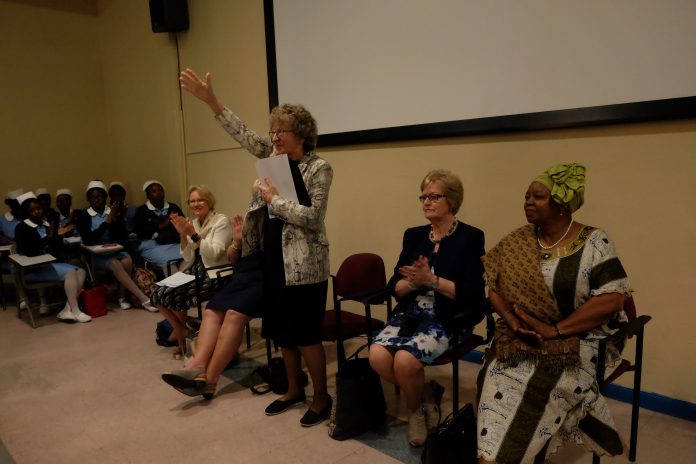
This blog was written by Dr. Barbara Stilwell, Executive Director of the Nursing Now campaign.
The Nursing Now team is currently in Nassau, The Bahamas, holding regional consultations with nurses from here, Trinidad and Tobago, and Brazil. Our party is made up of board members from Botswana, Ireland, and the UK. As we look across the beautiful harbour in Nassau, we see five enormous cruise ships moored here, full of tourists eager to explore the town. Last night we attended a celebratory cultural evening with nurses working here from India, Malaysia, Jamaica, Philippines, Trinidad and Tobago and Grenada. If ever there was a vivid example of an interconnected world, it is here. Tourists bring trade, nurses from other countries fill jobs and we celebrate our similarities and differences – but in an interconnected world, we also share our viruses.
The World Health Organization declared a global pandemic this week based on person to person spread of the novel coronavirus, COVID-19 that is not linked to someone who has traveled to an infected area. Once a pandemic is declared, it is likely that there will be wide community spread, and governments and health systems need to ensure that they are prepared.
While COVID-19 has not yet reached The Bahamas, nurses here are being deployed to get ready for it. Supplies are being checked – masks, gloves, bleach, personal protection equipment – as being prepared for a pandemic is critical. As well as supplies, preparedness must include surveillance so that new cases are quickly identified and reported. And as we see with COVID-19, individuals, families, and communities have a critical role in preventing disease spread. The Bahamas is setting a great example – all countries must now be prepared for the pandemic – and nurses must be integrally involved.
Nurses constitute the largest cadre of the health workforce in every country. But this is not only about numbers: nurses have always been at the heart of infection prevention and control, both by recognising infections and ensuring appropriate isolation and also by preventing infections through hygiene measures and community education. Specialist infection control nurses are an important part of pandemic preparedness, investigating outbreaks and undertaking contact tracing, as well as collecting data to guide strategic actions.
The Nursing Now team sees first hand the dedication of nurses everywhere to the health of their communities. As we face this global pandemic, the role of nurses is critical to educate people about the virus, prevent the spread of the disease, and care for those affected.
Here are some recommendations for Nursing Now groups:
- Demand that nurses are fully educated about COVID-19, how to recognise it, and prevent it. The International Council of Nurses (ICN) is stressing that nurses should share information and learning, and back the World Health Organization’s (WHO) new “Be Ready” campaign.
- Using Nursing Now’s extensive network is one way to share what is happening where you are and what you are learning, as well as through your professional associations.
- Ask for the supplies that you will need. Investing in supplies and equipment for nurses is essential to protect health workers, patients and the public. Work with your managers to make a data based case for what will be required.
- Educate the public, your family and friends. Make sure that accurate information is getting out about hand washing, social distancing, and self-isolation. COVID-19 is a virus that seems to be easily spread so preventing spread with these measures will make a huge difference to the most vulnerable people. There is a temptation to think of the virus in the same way we think of other threats – that we should ‘stand up to it’ somehow, and not let our lives be disrupted. But this is not true – and as nurses, we know this.
- Look after yourself and your colleagues! There is a huge amount of stress for health workers right now – how are you coping? And can you offer support to a colleague? As WHO says – Be Kind!


